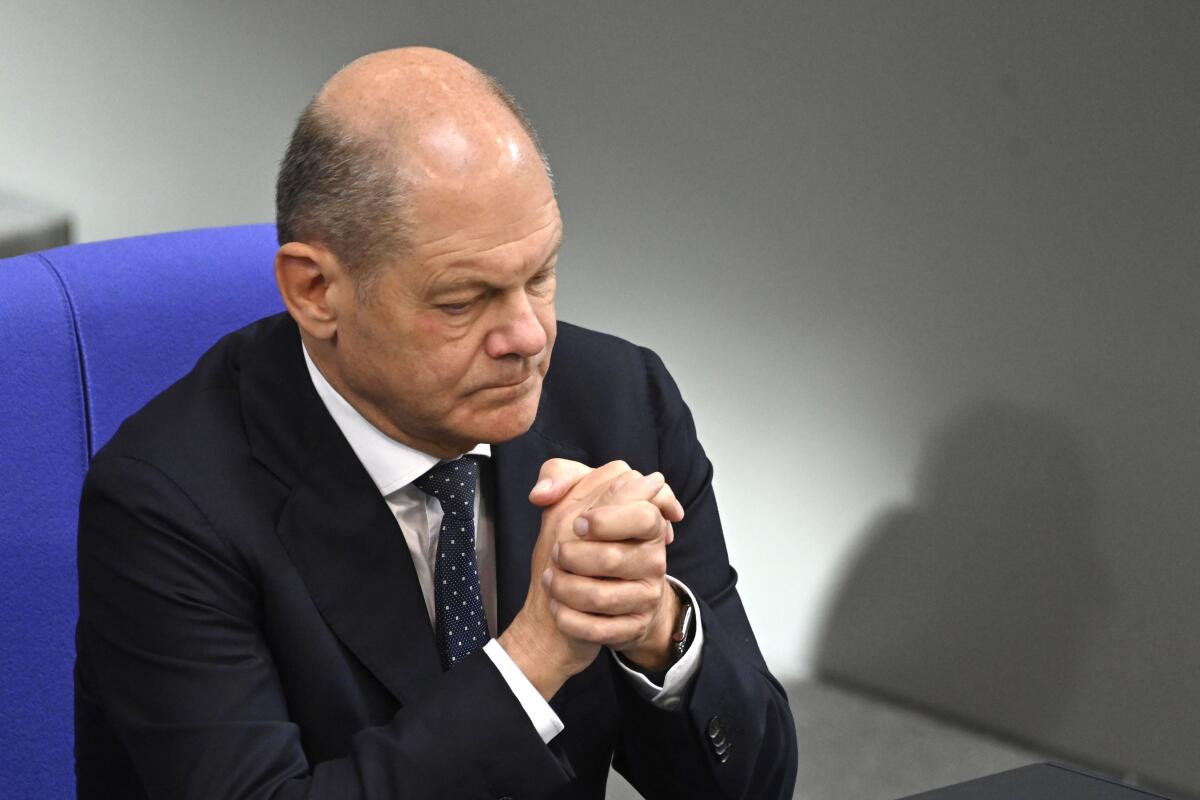Germany’s chancellor, state governors agree on new measures to curb migration

- Share via
BERLIN — Chancellor Olaf Scholz and the governors of Germany’s 16 states agreed on new and stricter measures to curb the high number of migrants flowing into the country, reaching a compromise on an issue that has become a huge political problem for the government and a hot-button public topic.
The new measures include speeding up asylum procedures, benefit restrictions for asylum seekers and more financial aid from the federal government for the states and local communities dealing with the growing numbers of migrants.
Speaking early Tuesday after an overnight meeting that lasted several hours, Scholz, a Social Democrat who leads a center-left government, called the agreement “a historical moment” — a remark that showed how much of a burden the topic had become for the government.
The number of new asylum applications for the year to date was around 73% higher at the end of September than in the same period last year, official statistics show.
Shelters for migrants and refugees have been filling up in Germany for months, and Scholz, who faces enormous pressure from the opposition and elsewhere to halt that trend, has said that “too many are coming.”
Germany has also taken in more than 1 million Ukrainians since the start of Russia’s war on its neighbor.
During Europe’s 2015 migrant crisis, Germany took in more than 1 million newcomers, sparking a backlash by some. Five years on, tensions have eased.
Over recent weeks, there had been a flurry of government activity, including legislation to ease deportations of unsuccessful asylum seekers, stiffen punishment for smugglers, allow asylum seekers to start working sooner and introduce temporary checks on the Polish, Czech and Swiss borders.
The federal and state governments agreed Tuesday to change the system for financing the costs for the asylum seekers. Starting next year, the federal government will pay an annual lump sum of about $8,000 for each asylum seeker and no longer a total annual sum of around $4 billion.
Scholz called the reform a “transition to a breathing system” and said that “with rising numbers, there is more money; with falling numbers, there is less.”
Asylum seekers are also to receive at least part of their benefits as credit on a payment card, meaning they will get less cash in the future.
Inventors of a COVID-19 vaccine, top politicians and film stars are among the Germans with Turkish roots blazing new trails in societal acceptance.
Some state governors had called for a new system of conducting asylum procedures outside of Germany to keep the migrants from arriving in the first place, but that measure didn’t pass. However, the federal government said it would examine whether asylum procedures outside the European Union are possible.
Several European countries, including Britain and Denmark, have been looking into processing asylum seekers remotely to keep them from entering their countries. On Monday, Italy reached a deal with Albania for the latter country to give such migrants temporary shelter while their asylum bids are being processed.
The controls that Germany established at its borders with Switzerland, the Czech Republic, Poland and Austria are to be extended, but the time period was not clear.
Opposition leader Friedrich Merz, from the center-right Christian Democratic Union, rejected Scholz’s contention that the migration deal was “historic.”
Most of the 32,000 migrants who have made the treacherous boat journey on the Atlantic Ocean to Spain’s Canary Islands this year arrive from Senegal.
“I expressly disagree with the categorization as historical. It was a step forward,” he told reporters in Berlin on Tuesday.
“The decisive factor is that the figures have to come down,” Merz added. “And I have a big question mark over whether they will actually go down with these measures.”
More than 250,000 people applied for asylum in Germany in the period from January to September, compared with more than 130,000 in the same time period last year.
The majority of asylum seekers came from Syria, Afghanistan and Turkey.
More to Read
Sign up for Essential California
The most important California stories and recommendations in your inbox every morning.
You may occasionally receive promotional content from the Los Angeles Times.















